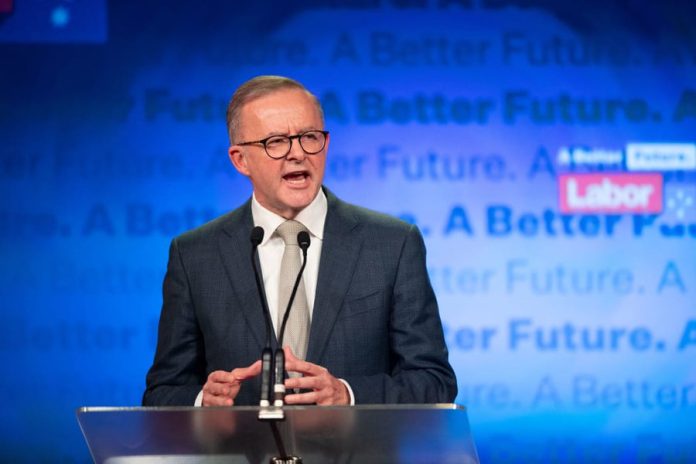The Solomon Islands has congratulated Australia’s Labor leader, Anthony Albanese, on his election victory, saying much “remains to be done” in the bilateral relationship, as Pacific islands neighbour Fiji welcomed the party’s climate policies.
Albanese said he would be sworn in as the 31st prime minister on Monday along with four senior party members, even as vote counting continues, before heading to Tokyo to attend a “Quad” summit on Tuesday with U.S President Joe Biden and the prime ministers of Japan and India. read more
The Solomon Islands’ recent signing of a security pact with China was a major election issue for outgoing Prime Minister Scott Morrison, with Western allies concerned it could provide a gateway for a Chinese military presence in the Pacific.
China’s foreign minister, Wang Yi, is expected to visit the Solomon Islands this week, local media have reported, although Reuters could not confirm that with Solomon Islands Prime Minister Manasseh Sogavare’s office.
In a statement on Sunday, Sogavare said his nation “remains Australia’s steadfast friend and development partner of choice”.
The Solomon Islands are grateful for Australia’s financial, medical and security support over the years, he said, adding “much however, remains to be done”.
Sogavare had written to Albanese and “assured him of taking Solomon Islands’ relationship with Australia to another level under Albanese’s tenure”.
Fiji Prime Minister Frank Bainimarama congratulated Albanese in a tweet, writing: “Of your many promises to support the Pacific, none is more welcome than your plan to put the climate first.”
With Fiji’s borders open, we hope to host you soon!” said Bainimarama.
In his reply Albanese said in a tweet “Thank you @fijipm – I look forward to working with Pacific countries to build a stronger Pacific family”
Anote Tong, the former president of Kiribati and a leading climate campaigner, said: “It is no secret that I have been disappointed with the attitudes of the previous Australian government towards the Pacific on a number of fronts, including climate change.
“My hope is that we will see stronger and more urgent climate action from the incoming government, including a more ambitious emissions reduction target, ramped-up support for climate-vulnerable communities in the Pacific and most importantly, a commitment to no new coal and gas projects in Australia.”
Tong said that while he welcomed Albanese’s proposal to host a COP summit in conjunction with Pacific island nations “this cannot be used to greenwash Australia’s inadequate climate policies”.
Enele Sopoaga, the former prime minister of Tuvalu, who clashed with Morrison at the last in-person Pacific Islands Forum in 2019, said he welcomed the incoming government.
“Time is running out on climate change not only for Small Island Developing States like us in the Pacific, but also for Australia and the rest of the world. Our security, together with our survival, is at peril,” he said.
“I can only hope that this new Australian government will make a radical shift towards strong and urgent climate action and genuine support for the Pacific. This would include radical new Australian targets for emissions reduction under the Paris Agreement, no new coal or gas, and an ongoing commitment to supporting Pacific Island nations as we face the brunt of climate impacts.”
New Zealand Prime Minister Jacinda Ardern said that she had called Albanese on Sunday, and that the two countries would continue to work together “deepening our partnership with our close friends in the Pacific, and advancing our interests on the world stage”.
“Australia and Aotearoa New Zealand are at our best when we work together,” she said.
New Zealand and Australia, while closely allied, have had some tense moments under Morrison’s leadership – particularly over the Australian “501” policy of deporting residents with New Zealand citizenship on bad character or criminal record grounds, even if they had lived their entire lives in Australia.
In 2020, Ardern lashed out at Morrison at their annual bilateral summit, saying the policy was “testing” the friendship between the two nations, and Australia was deporting “your people and your problems” using “unfair” policies.
The New Zealand government has pushed repeatedly for a reconsideration of the policy, and will probably be hoping for movement under a new government.
Also at the top of New Zealand’s concerns is the wider security of the Indo-Pacific, and the growing influence of China in the region.
New Zealand’s rhetoric on China has typically been gentler than Australia’s, and the country has at times been accused by Australian commentators of being hamstrung by its significant trade reliance on China.
The UK prime minister, Boris Johnson, and the Indian prime minister, Narendra Modi, were among the first world leaders to respond to news of the Scott Morrison government’s electoral defeat.
Johnson pointed to the free trade agreement and the Aukus partnership as the basis for an ongoing relationship when he tweeted his congratulations on Sunday night.
Modi tweeted his congratulations after midnight in Australia and highlighted his wish for the continuation of key security agreements ahead of a meeting of the Quad on Tuesday.
The U.S president, Joe Biden, who will also meet Albanese at the Quad summit on Tuesday, called to congratulate him, the White House said.
“President Biden reaffirmed the United States’ steadfast commitment to the U.S-Australia alliance and his intent to work closely with the new government to make it stronger still,” it said in a statement. “President Biden expressed deep appreciation for the prime minister-designate’s own early commitment to the alliance, reflected in his decision to travel almost immediately to Tokyo to attend the Quad summit.”
SOURCE: REUTERS/THE GUARDIAN/PACNEWS














